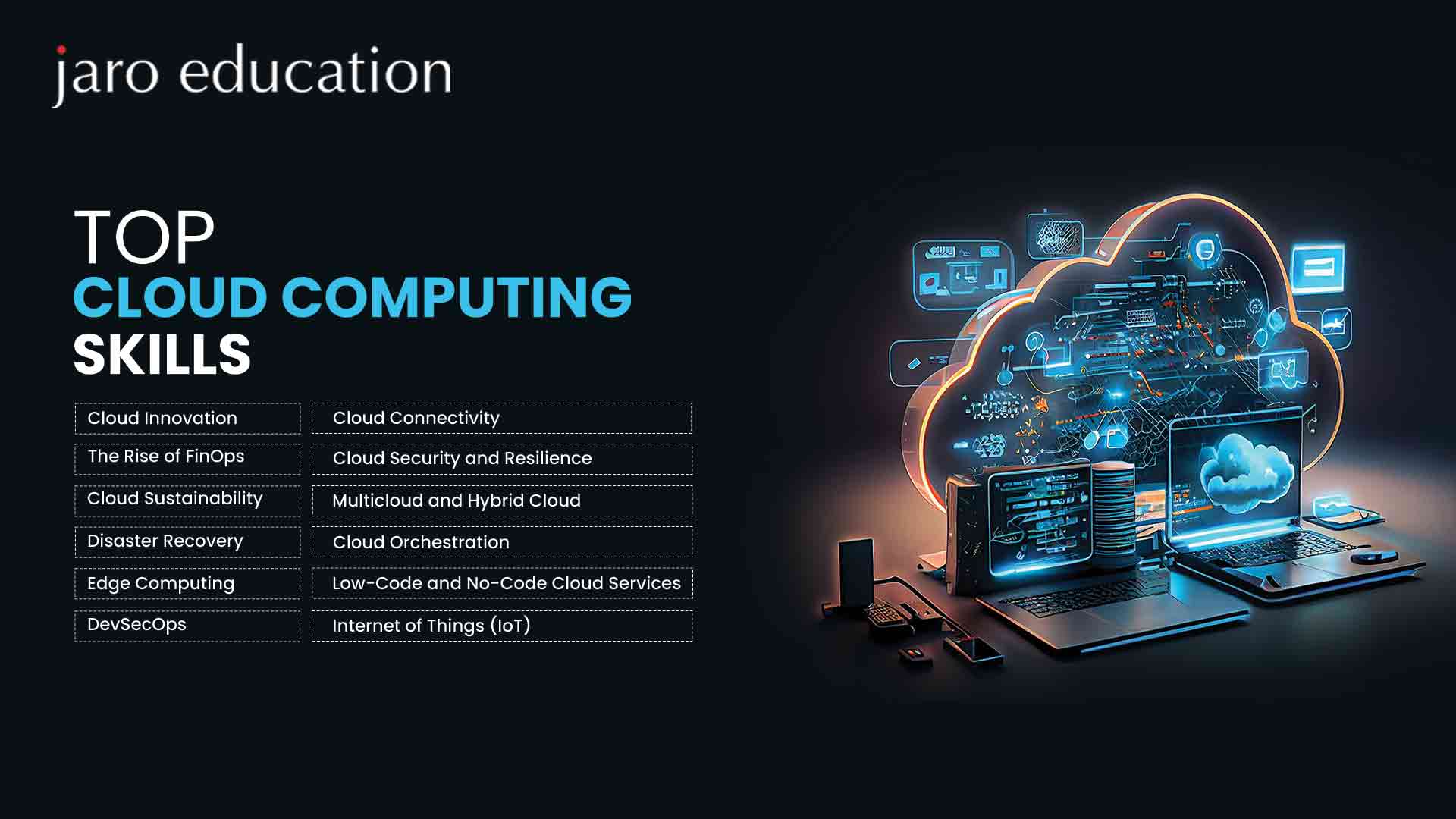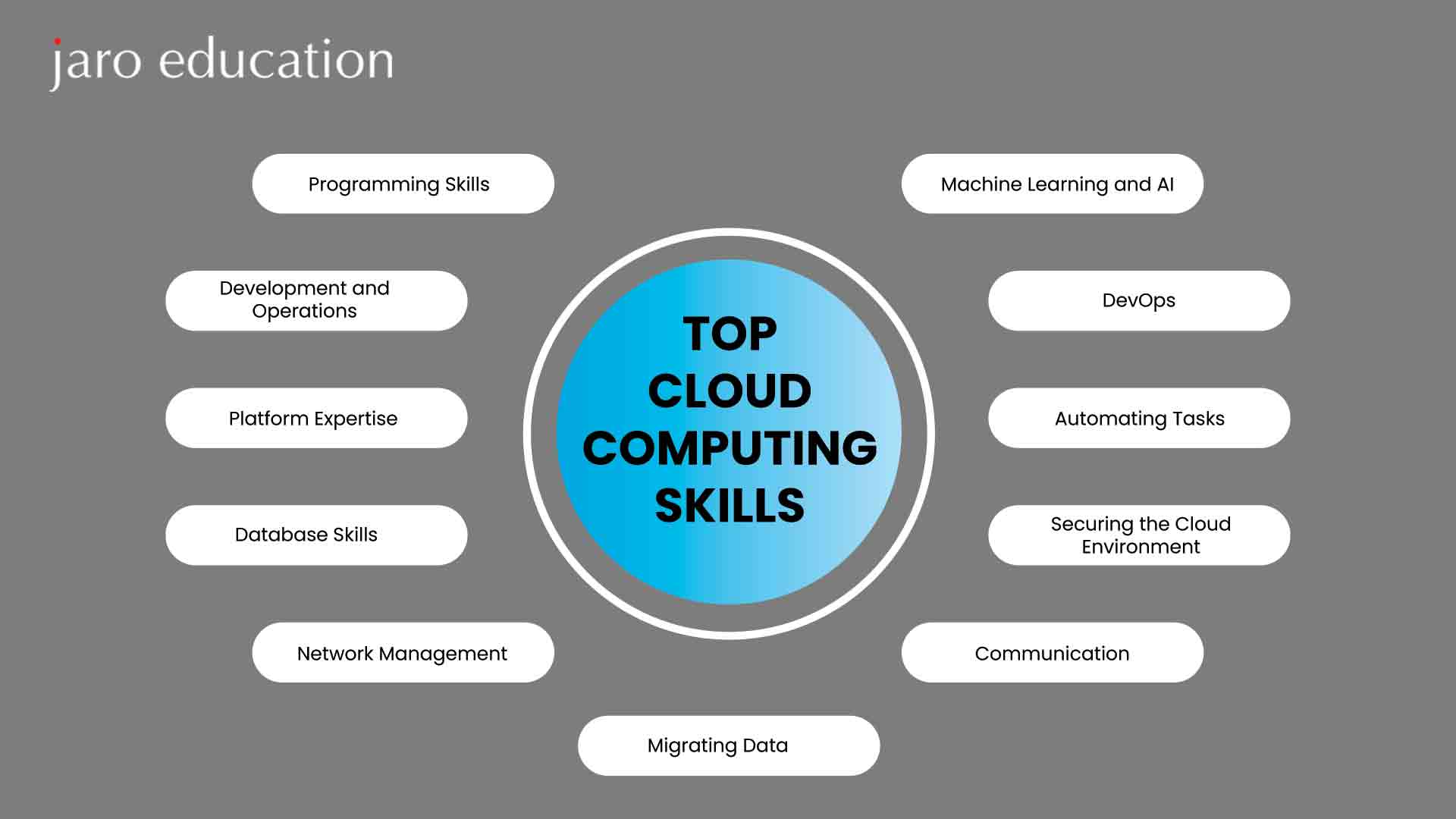
- jaro education
- 12, April 2024
- 10:00 am
The shift from traditional physical data centers to cloud computing platforms has become paramount. According to Gartner, a leading research firm, a staggering 85% of organizations have declared their intent to adopt a “cloud-first” approach by 2025. This trend is further reinforced by the prediction that half of enterprise IT spending will be directed towards cloud-based solutions.
The three major players dominating the cloud services arena are Amazon Web Services (AWS), Google Cloud Platform (GCP), and Microsoft Azure. These platforms have revolutionized the way companies manage their computing resources, offering scalability, flexibility, and advanced capabilities.
This blog provides valuable insights into the various job roles within cloud computing engineering, including salary considerations based on roles and experience. Additionally, it sheds light on the emerging trends that professionals in the cloud computing field should be mindful of.
What are Cloud Computing Engineers?
A cloud computing engineer is an IT professional tasked with constructing and managing cloud infrastructure. These engineers often specialize in various areas such as cloud architecture (creating cloud solutions for businesses), development (coding specifically for cloud platforms), and administration (managing cloud networks).
Table of Contents
The prevalence of cloud technology has surged in recent times, impacting various aspects of our daily lives such as watching TV, streaming music, or using email services. From a corporate perspective, cloud technology facilitates easier data storage and backup, enables on-demand software updates, and grants customers access to their information across multiple devices. As a cloud engineer, your role involves ensuring the seamless operation of these systems behind the scenes.
What do Cloud Computing Engineers do?
Cloud computing engineers handle all the technical stuff related to cloud computing and focus on building and maintaining the cloud-based setup. Their job includes finding and combining private and public cloud services to make sure the organization’s operations are safe and smooth. They will also install applications, keep an eye on how well things are working, and improve cloud environments. Working with different teams, you’ll solve problems, follow the best practices for cloud security and cost-efficiency, and keep up with the latest advances in cloud tech. They will also keep making the cloud systems better to meet the organization’s needs.
Here are some everyday tasks for cloud computing engineers:
- Moving a company’s computer data or systems to their cloud setups.
- Organizing different parts of the cloud infrastructure like networks and security services.
- Making apps and databases that work in the cloud.
- Keeping an eye on how cloud services are managed and data is stored.
- Making sure data stays safe and secure.
- Handling, overseeing, and offering help to clients if there are any cloud-related issues.
Salary of Cloud Computing as per Job Role
As data security becomes a top priority for all businesses, the need for cloud computing services is expected to surge. Companies are seeking professionals who can efficiently manage cloud operations and enable all team members to leverage these services seamlessly. Additionally, organizations are keen on recruiting top-notch experts and offering competitive salaries to cloud computing engineers to ensure the best talent is retained.
Cloud Administrator
A cloud administrator’s role revolves around upholding a company’s cloud infrastructure and operational capacity. They play a vital role in aiding clients with the setup of their cloud services, collaborating closely with cloud engineers and other management personnel to guarantee the seamless operation of networks.
In India, the Average annual income for a Cloud Administrator amounts to around ₹8,13,989. Additionally, Cloud Administrators can expect an average extra cash incentive of ₹86,968, spanning between ₹83,709 to ₹90,227, as per Glassdoor.
Cloud Engineer
A cloud engineer is a highly skilled professional who specializes in designing, implementing, and managing cloud-based systems and solutions. Their primary role involves understanding the technical requirements and business objectives of an organization and then architecting cloud infrastructures that align with these needs. This includes selecting the right cloud platform (such as AWS, Azure, Google Cloud, etc.), designing scalable and reliable architectures, and ensuring robust security measures are in place.
Cloud engineers are proficient in various cloud technologies, including virtualization, containerization, serverless computing, and networking protocols. They work closely with development teams to deploy applications in the cloud, optimize performance, and manage resources efficiently. Additionally, cloud engineers play a crucial role in implementing automation, monitoring tools, and disaster recovery plans to enhance the reliability and resilience of cloud environments.
The average annual salary for a Cloud Engineer in India is around ₹14,28,160. Additionally, Cloud Engineers receive an average of ₹7,18,160 in extra cash compensation. This additional cash compensation can vary, ranging from ₹6,92,316 to ₹7,44,005 depending on factors such as experience, skills, and the employer’s compensation structure, as per Glassdoor.
Cloud Developers
Cloud developers are software engineers or developers who specialize in creating applications, services, and solutions specifically designed to run on cloud platforms. They leverage cloud-native technologies and frameworks to build scalable, distributed, and resilient applications that take full advantage of cloud resources.
Cloud developers work with programming languages such as Python, Java, C#, and JavaScript, along with cloud-specific tools and APIs provided by cloud service providers. They focus on optimizing applications for cloud environments, implementing microservices architectures, and leveraging cloud-based databases, storage, and compute resources.
The average salary earned by Cloud developers in India stands at approximately ₹11,45,640 per year, according to Glassdoor.
Cloud Support Engineers
Cloud support engineers, also known as cloud operations engineers or cloud support specialists, are responsible for providing technical support and troubleshooting assistance for cloud-based systems and services. They work closely with customers, internal teams, and external vendors to address issues, resolve challenges, and maintain optimal performance of cloud environments.
Cloud support engineers possess deep knowledge of cloud platforms, services, and configurations. They troubleshoot network connectivity issues, resolve performance bottlenecks, and assist with cloud migrations and deployments. Additionally, they monitor system health, analyze logs and metrics, and implement proactive measures to prevent downtime and ensure high availability of cloud services.
In India, the typical annual salary for a Cloud Support Engineer stands at approximately ₹26,34,440. On top of this base salary, Cloud Support Engineers may also receive additional cash compensation, averaging around ₹16,21,219 per year. This supplementary compensation can vary significantly, ranging from ₹3,62,439 to ₹28,80,000, depending on factors such as experience, skills, and employer policies, as per Glassdoor.
System Administrator
In the context of cloud computing, a system administrator (or cloud system administrator) plays a vital role in managing and maintaining cloud infrastructure and resources. They are responsible for provisioning and configuring cloud instances, managing user access and permissions, and ensuring the security and compliance of cloud environments.
System administrators monitor system performance, troubleshoot issues, and optimize resource utilization to enhance the efficiency and reliability of cloud-based systems. They also implement backup and recovery strategies, manage data storage solutions, and oversee the deployment of updates and patches to keep cloud environments secure and up-to-date.
As per Glassdoor, the typical annual salary for a Systems Administrator in India is approximately ₹5,42,000. On top of this base salary, the average additional cash compensation for professionals in this role amounts to around ₹42,000 per year. However, this additional cash compensation can vary, with some individuals receiving as low as ₹36,000 and others as high as ₹48,000, depending on factors such as experience, skills, location, and the specific organization they work for.
Cloud Architect
A Cloud Architect is a specialized IT professional responsible for designing and implementing cloud computing solutions and strategies within an organization. Their primary role involves understanding business requirements, evaluating cloud technologies, and creating comprehensive architectural designs that leverage cloud resources effectively. Cloud Architects design scalable, reliable, and secure cloud infrastructures, considering factors such as performance optimization, cost efficiency, and regulatory compliance. They collaborate with stakeholders, including developers, engineers, and management, to ensure that cloud solutions align with business goals and technical standards.
The typical annual income for a Cloud architect in Bangalore, India, stands at around ₹19,50,000, according to Glassdoor..
Cloud Computing Engineer Salary based on Experience
Let’s delve deeper into how your level of experience can significantly impact the salary you command when entering the cloud computing industry:
Entry-Level
Starting a journey in the cloud computing sector may not initially offer a high salary, but it opens up a plethora of opportunities. The good news is that these opportunities will continue to grow in the future, making the starting salary for cloud computing freshers in India more lucrative. It’s crucial to explore certification programs that can kickstart your career as a cloud engineer. Typically, expect a starting salary of 5-7 LPA (Lakhs Per Annum), regardless of your specific job role.
Mid-Level
After accumulating around five years of experience in cloud computing services, cloud computing engineers qualify for better job prospects. Their career trajectory will witness a significant upward trend, accompanied by a corresponding increase in your salary. At the intermediate level of experience, they can anticipate job opportunities offering an average cloud computing salary in India of approximately 13-18 LPA.
Advanced-Level
At the advanced level or in top management roles within the cloud computing domain, They can get the most lucrative salary packages. Advancing to this level typically requires over a decade of hands-on experience. Professionals at this stage can expect a salary in the range of 20-22 LPA.
Here is how Career path in Cloud computing look like:
| Position | Experience | Average Annual Salary (INR) |
|---|---|---|
| Cloud Engineer | 2 - 4 Years | ₹5L - ₹12L |
| Senior Cloud Engineer | 2 - 4 Years | ₹8L - ₹20L |
| Cloud Engineer II | 2 - 4 Years | ₹13L - ₹18L |
| Cloud Engineer III | 5 - 7 Years | ₹9L - ₹23L |
| Lead Cloud Engineer | 5 - 7 Years | ₹16L - ₹22L |
| Cloud Engineer Senior Staff | 8+ Years | ₹20L - ₹22L |
*Glassdoor
Skill Set for Cloud Computing Engineers
Cloud computing engineers need to be skilled in several key areas to excel in their roles:
- Linux: Cloud computing engineers need a solid grasp of Linux OS, given its prevalent use in cloud development. This includes understanding Linux server architecture, maintenance, and administration.
- Database Management: Cloud computing engineers should possess skills in managing cloud databases, particularly MySQL and Hadoop.
- Programming: A robust foundation in programming is essential, covering languages like SQL, Java, Python, Ruby, Golang, PHP, and .NET.
- Networking: Familiarity with virtual networks and general network management is necessary for cloud engineers.
- DevOps Practices: Hands-on experience with DevOps practices, especially AWS DevOps, is highly valued in the industry.
- Containerization: Proficiency in containerization tools like Docker and Kubernetes is essential for efficient cloud deployment.
- Virtualization: Knowledge of deploying and running application software on virtual machines is a fundamental skill.
- Cloud Provider Understanding: Awareness of different cloud providers’ technical features and practices enhances a cloud engineer’s marketability.
- Security and Recovery: Given the growing emphasis on cloud security, expertise in cybersecurity within the cloud context is invaluable.
- Web Services and APIs: Understanding open standards such as XML, SOAP, WSDL, and UDDI, along with API engineering, is crucial for cloud engineers.

*www.edoxi.com
Trends for Cloud Computing in 2024

AI and ML
Artificial Intelligence (AI) and Machine Learning (ML) are cutting-edge technologies closely associated with cloud computing. These technologies are cost-effective because they demand significant computational power and storage for data collection and training purposes. Emerging trends in this sector include self-automation, self-learning capabilities, personalized cloud solutions, robust data security, and privacy measures. Major players in the cloud industry like Amazon, Google, and IBM are heavily investing in AI and ML. For instance, Amazon’s AWS DeepLens camera and Google Lens exemplify products grounded in machine learning.
Data Security
Data security is paramount for businesses and organizations, with no room for compromise. Protecting organizational data from threats such as leaks, deletions, and unauthorized modifications is crucial. Mitigating these risks involves implementing various measures.
Serverless architecture
It is a technique that delivers backend services based on individual user needs. This approach eliminates the requirement for developers to handle server management when executing their code. Instead, the cloud service provider takes care of code execution. Users are billed according to a pay-as-you-go model, meaning they only pay when their code is active, rather than paying for a dedicated server regardless of usage. With serverless computing, users do not need to invest in purchasing servers, as the cost is managed by a third party. This approach is beneficial for reducing infrastructure expenses and improving scalability.
Low Code- No Code Solution
Today, businesses can leverage low-code and no-code cloud solutions to develop applications and harness the power of AI and its related fields. These solutions enable the creation of websites, apps, services, and more without the need for in-depth technical knowledge. This approach significantly reduces the time and cost involved in developing solutions, leading to faster product development cycles and fewer errors. Tools like Figma and Zoho empower users to design and build websites, apps, and services without the complexities of traditional computing infrastructure and coding requirements.
Edge Computing Advancements
Edge computing includes data storage, processing, and analytics performed closer to the data source geographically. This means that computation and data storage occur nearer to the sensors and devices generating the data. Edge computing offers numerous benefits, including reduced latency, improved efficiency, enhanced privacy and security, and rapid data transmission rates. It operates in real-time and processes data without time constraints.
IoT
The Internet of Things (IoT) is an increasingly popular trend that involves the utilization of numerous sensors to generate substantial amounts of data, which is then stored on cloud servers. IoT employs a variety of sensors and actuators to gather data and conducts analysis on this data to produce insights beneficial for making business decisions. This trend encompasses connectivity between computers, networks, and servers, enabling remote data collection and communication with devices.
Kubernetes and Docker
Kubernetes is an open-source orchestration platform that automates scaling, management, and deployment of applications. It offers cloud network users automation capabilities, allowing organizations to select a Kubernetes platform that aligns with their specific requirements. On the other hand, Docker is a platform enabling developers to package applications into containers and deploy them seamlessly across various environments.
Conclusion
In conclusion, cloud engineer salaries exhibit a range that correlates with experience levels, offering competitive entry-level pay for freshers and higher packages for seasoned professionals. By investing in cloud computing courses to enhance expertise and broaden career prospects, individuals can significantly boost their earning potential in this dynamic field.
Cloud computing remains a highly sought-after skill set in the IT industry, presenting a multitude of opportunities for professionals to contribute to companies’ technological advancement. Embracing the challenges and innovations of the cloud equips individuals for a rewarding career path, enabling them to play a pivotal role in shaping the future of technology-driven businesses.









